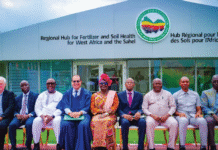Southern African regional agriculture players want a reviewed policy to wean off policies and bureaucratic practices using fertiliser and other innovations to bolster crop output and enhance food security on the continent.
The African Fertilizer and Agribusiness Partnership (AFAP), a continental independent non-profit organization has mooted a framework for achieving agriculture development using the private sector.
It wants to use it as a bait to bolster agriculture development set in place by African nations and leaders during the 2014 Malabo meeting to be food self-sustaining but has been delayed.
The AFAP regional public private dialogue dubbed: “The future of fertilizer and agro-inputs in Africa” campaigning for a unity between public and private sectors for sustainable development projects and policies is promoting a tailored market-driven business solutions in the sector’s inputs and agribusiness value chain using technical expertise with entrepreneurial innovation.
The Southern African Development Community member countries are in support of agriculture reforms with help from AFAP only if demands among others-access to cheap financing and other observations are met without delay before actualizing the partnership.
The players cite bureaucracy – Labelling – Cost effective practical regulations also inclusive of private sector views – Acceleration harmonizing fertilizer policies in the region – Quality control testing facilities and low adoption rates – Cost of transportation/availability and Infrastructure – Quality – Climate change as some of the challenges faced.
The cost of fertilizer; stocks, availability, sales – General global price increases from suppliers (freight and price @ source) add to the conundrum. At customs clearing points there is untamed bureaucracy: bribery and corruption, among officers, among other concerns needing urgent review.
The high cost of finance from commercial banks, absence of supplied credit, lack of information on private to public dialogue, informal existence of SMEs, no subsidy for the private sector on various procurements.
According to the report seen by FRA, the private sector, while keen to form an alliance with AFAP, seeks redress on infrastructure; bad road; warehouse; security; energy supply) – All the previous points are constraints affecting fertilizer value chain.
Fertilizer prices, costs, stocks, availability, sales remain a challenge and there is too much dependency on imports of the commodity yet Africa has its own capacity, though under-utilized.
Reverse the unpredictable Government Interventions, make clear cut fertilizer policy and make farming predictable. There is a need for Soil mapping- to enable correct fertilizer formulations and applications.
AFAP should facilitate the review of lengthy process of new product registration, and lobby for the implementation of harmonized regional regulatory standards through the much touted- Africa Continental Free Trade Area.
There is an urgent need to moot strategies to respond to high prices and fertilizer shortages.
AFAP should seek to initiate and invest in local production of fertilizers either through joint (consolidated/bulk) sourcing of fertilizers or creation of a fertilizer association.
AFAP in collaboration with regional leadership should promote innovative financing facilities; decrease the fees/levies payable by the private sector; harmonization of the regulatory frameworks at country level and seek reforms of the subsidy programme,
Regional efforts should strive to enhance reliable storage/Warehousing – Regional planning on fertilizer imports facilitate affordable financing to allow forward contracts and good terms with suppliers and enhance local blending and production.
There is an urgent need for facilitating soil quality control facilities; Soil and fertilizer testing facilities; reducing duties and tariffs using possible regional subsidy initiatives – Provide financing – Regional integration of regulations, among other reforms.
Operating on the Food and Agriculture concept of “Eliminate hunger and reduce poverty by growing the agricultural sector in Africa”, AFAP has undertaken to promote its agriculture promotion ideology.
The service provider to the private and public sectors on sustainable development projects and policies wants to promote market-driven business solutions in fertilizer and agribusiness for agriculture productivity.
On 7-8 December, AFAP and in collaboration with COMESA, organized a public-private sector dialogue meeting in Lusaka at which various stakeholders expressed interest to work with the organization-established in 2012.
The players want to find a durable and lasting solution to growth agriculture in collaboration with capacitated interest groups.









